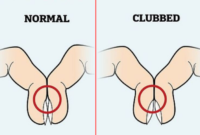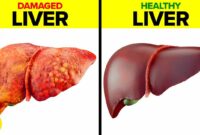4. NAUSEA OR VOMITING
As mentioned prior, one of the liver’s primary functions is to detoxify and help expel any toxic substances from the body. When the liver’s detoxification function is impaired, a number of problems can surface, including sudden changes in normal digestion and metabolism.
The liver is a large organ within the digestive system; therefore, any liver-related condition can manifest into digestive problems. Nausea and vomiting frequently occur due to the accumulation of toxins that the liver cannot eradicate.
5. BRUISING
Among the liver’s most important roles is to assist in the production of necessary protein enzymes. One classification of protein enzymes helps to prevent blood clots. When this blood-clotting mechanism is impaired, changes to the skin’s appearance are common.
Relatedly, according to the National Institute of Diabetes and Digestive and Kidney Diseases, “When the liver slows the production of or stops producing the proteins needed for blood clotting, a person will bruise or bleed easily.”
6. ABDOMINAL SWELLING
According to the Mayo Clinic, liver damage disrupts the normal flow of blood to the organ, which increases pressure in the surrounding veins. These “surrounding veins” include those responsible for transporting blood from the spleen and intestines to the liver. Disruption of this process causes blood pressure levels to spike – a condition known as portal hypertension.
Portal hypertension causes the accumulation of fluid around the abdomen; a condition called ascites. Ascites may also arise from the liver’s inability to make other blood proteins.
7. JAUNDICE
Liver problems can cause discoloration of the eyes and skin. This discoloration happens because of the buildup of a bile pigment called bilirubin, which cannot be properly be disposed of.
Yellowish hueing of the skin or eyes is called jaundice. Aside from altering the eye’s appearance, jaundice can cause other symptoms including darkening of the urine, full-body itching, and cognitive impairment.
Conclusion
The great news is that the liver is a highly adaptive and resilient organ when treated, and is often capable of healing itself. Under the guidance of a medical professional, most liver-related illnesses receive a positive prognosis.
It is wise to consult with a medical professional if any of these symptoms persist. As with most medical conditions, the earlier that the underlying cause is determined, the more streamlined and efficient any treatment will be.
glisson capsule,hepatocellular carcinoma treatment,rapid weight loss fatty liver,liver cancer treatment,common hepatic duct,hepatic duct,liver tumor treatment,easl 2021,alani nu balance lawsuit,new liver cancer treatment 2019,best liver detox,new liver cancer treatment 2020,nash diet,stage 4 liver cancer treatment,problems after liver transplant,secondary biliary cirrhosis,complications of hepatitis b,liver cancer age,cirrhosis ultrasound,life after liver transplant,breast cancer metastasis to liver end stages,livermd,liver doctors near me,biliary atresia,biliary atresia symptoms,liver specialist near me,secondary liver cancer final stages,alcoholic hepatitis treatment,fibrolamellar hepatocellular carcinoma,cirrhosis rash,liver md,cirrhosis skin rash,hepatocellular carcinoma pathology outlines,liverwell,sleisenger,fibrolamellar carcinoma,benign liver tumor symptoms,breast cancer metastasis to liver,liver clinic,liver cysts back pain,hepatocellular,keto and fatty liver,best liver support,li rads,hepatocellular cancer,hepatic cancer,liver fibrosis test,primary biliary cirrhosis treatment,liver cell carcinoma,hepatocellular carcinoma prognosis,primary biliary cirrhosis,types of chronic liver disease,liver specialist,normal liver function test,best liver support supplements,liver carcinoma,acute hepatic failure,liver cleanse detox,liver pathology,secondary liver cancer life expectancy,liver cancer surgery,hepatic carcinoma,acute alcoholic hepatitis,liver institute,stage 4 metastatic liver cancer life expectancy,best liver supplements,metastatic liver cancer stage 4,age spots on skin,liver function test cost,chronic hepatitis b treatment,pancreatic and liver cancer final stages,liver cancer blood test,liver transplant,best liver cleanse,liver transplant recovery,liver support supplement,liver function test price,bowel and liver cancer final stages,liver transplant cost,primary liver cancer,liver plus,liver support,liver and kidney failure life expectancy,hepatitis is an inflammation of the,viral hepatitis treatment,hepatocellular carcinoma,kidney and liver problems together,hepatitis c rash,stage 4 liver cancer survivors,liver location male,liver supplements,cholestatic,hepatic lesions,cholestatic hepatitis,best liver detox supplement,benign liver tumor,liver cirrhosis ultrasound,age spot treatment,hepatic mass,old age spots



